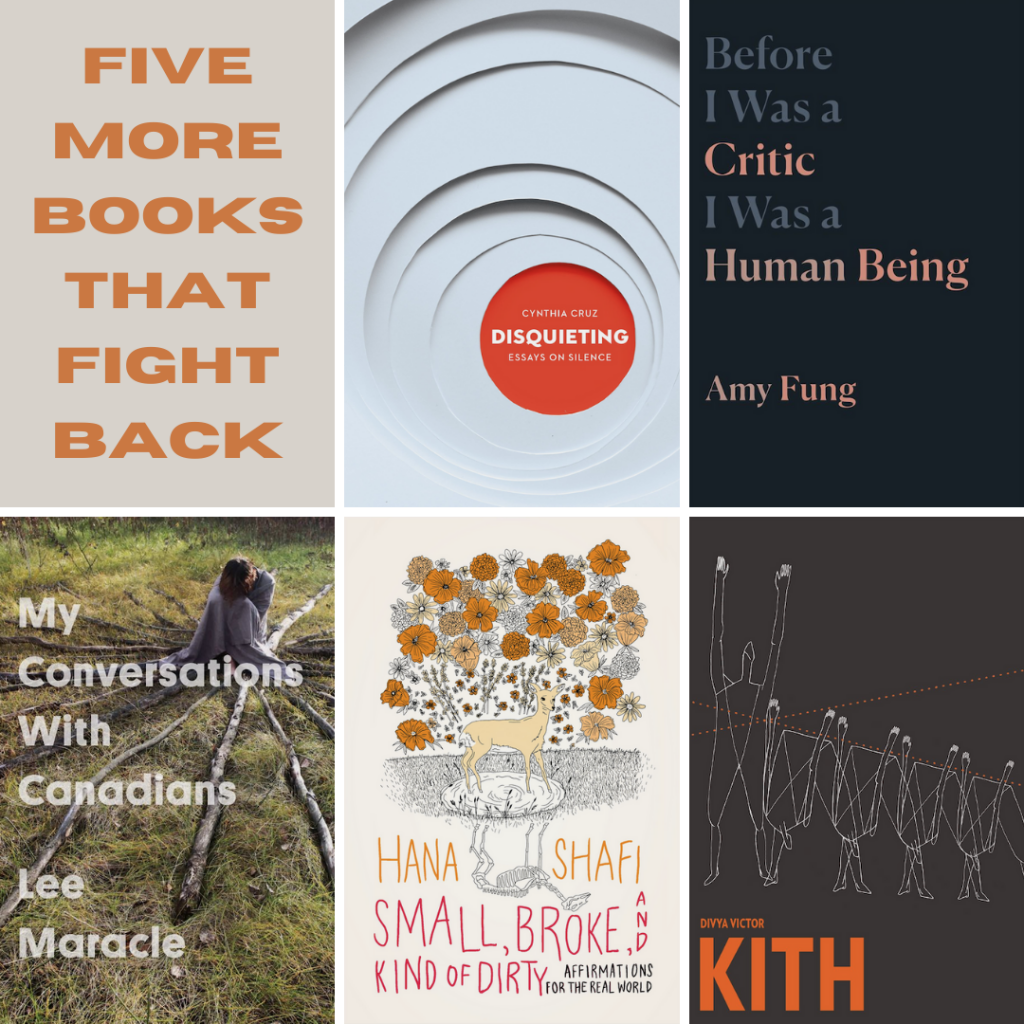Five More Books That Fight Back

We’re not done yet: our list of #booksthatfightback continues today with five more powerful titles. Like last week’s reading list, these books interrogate violent legacies with wit and wisdom. They empower us to educate ourselves—and others—and take action against systemic oppression.
Disquieting: Essays on Silence by Cynthia Cruz
Disquieting: Essays on Silence, Cynthia Cruz’s first work of nonfiction, draws on philosophy, theory, art, film, and literature to offer alternative ways of being in this world and possibilities for building a new one. Cruz tarries with others who have provided examples of how to “turn away,” or reject the ideologies of contemporary neoliberal culture. These essays inhabit connections between silence, refusal, anorexia, mental illness, and neoliberalism. Cruz also explores the experience of being working-class and poor in contemporary culture, and how those who are silenced often turn to forms of disquietude that value open-endedness, complexity, and difficulty.
“Cruz’s collection of essays is unafraid to dwell in this disquieting betwixt, this space that asks for radical listening, for redefinitions of worth and value, and for resistance to assimilation,” writes Emmalea Russo for the Los Angeles Review of Books. “Throughout the book, we learn that resistance is both necessary and painful, destructive and healing.”
Before I Was a Critic I Was a Human Being by Amy Fung
Amy Fung’s debut essay collection, Before I Was a Critic I Was a Human Being, is a close examination of Canada’s mythologies of multiculturalism, settler colonialism, and identity through the lens of a national art critic. Following the tangents of a foreign-born perspective and the complexities and complicities in participating in ongoing acts of colonial violence, the book as a whole takes the form of a very long land acknowledgement. Taken individually, each piece roots itself in the learning and unlearning process of a first-generation settler immigrant as she unfurls each region’s sense of place and identity.
“Amy Fung’s project—part essay collection and part extended land acknowledgement—presents complex narratives of the self that never settle, but shift and glitter around questioning of power and representation in art and writing,” writes Alex Leslie, author of Vancouver for Beginners and We All Need to Eat. Celebrated writer Eileen Myles adds, “[Amy’s] sheer skill and playfulness at the absolute noun and especially verb level where writing lives make the hours I’ve spent with this knowing and moving book about place and placelessness among the most valuable ones of my reading life.” Before I Was a Critic was longlisted for The Believer Book Award for Nonfiction.
My Conversations with Canadians by Lee Maracle
On her first book tour at the age of twenty-six, Lee Maracle was asked a question from the audience, one she couldn’t possibly answer at that moment. But she has been thinking about it ever since. As time has passed, she has been asked countless similar questions, all of them too big to answer, but not too large to contemplate. These questions, which touch upon subjects such as citizenship, segregation, labour, law, prejudice and reconciliation (to name a few), are the heart of My Conversations with Canadians. In prose essays that are both conversational and direct, Maracle seeks not to provide any answers to these questions she has lived with for so long. Rather, she thinks through each one using a multitude of experiences she’s had as a First Nations leader, a woman, a mother, and grandmother over the course of her life. As Maisonneuve writes, “Maracle develops a relationship with her audience that feels intuitive and intimate, yet weaves together something far more comprehensive than any interview or conversation could provide.” My Conversations with Canadians was shortlisted for the 2018–19 First Nation Communities READ Award and the 2018 Toronto Book Award.
Small, Broke, and Kind of Dirty: Affirmations for the Real World by Hana Shafi
Built around art from Hana Shafi’s popular online affirmation series, Small, Broke, and Kind of Dirty focuses on our common and never-ending journey of self-discovery. Drawing on her experience as a millennial woman of colour, and writing with humour and a healthy dose of irreverence, Shafi (a.k.a. Frizz Kid) delves into body politics and pop culture, racism and feminism, friendship, and allyship. This is not an advice book: it’s a call to action, one that asks us to remember that we are valid as we are—flaws and all—and to not let the bastards grind us down. We’ll defer to singer-songwriter Bif Naked, who writes that “Small, Broke, and Kind of Dirty might just change the world.” The book was released this week on September 22nd. Congratulations, Hana!
Kith by Divya Victor
Divya Victor’s essential poetry collection, Kith, explores questions about race and ethnic difference: how do “brownness” and “blackness” emerge as traded commodities in the transactions of globalization? What are the symptoms of belonging? How and why does “kith” diverge from “kin,” and what are the affects and politics of this divergence? Historically-placed and well researched, Kith is an unflinching and simultaneous account of both systemic and interpersonal forms of violence and wounding in the world today. Award-winning author Amitava Kumar writes that, for Victor, “history is a wound. And the poet’s language is bright like the white bandage on which blood shows more clearly. What we have on display in this book is an imagination that is as wide as the world. Part-anthem, part-instruction manual, part-memoir, part-dictionary, this text offers testimony to other ways of being and remembering, a reflection on forgotten lives.”

